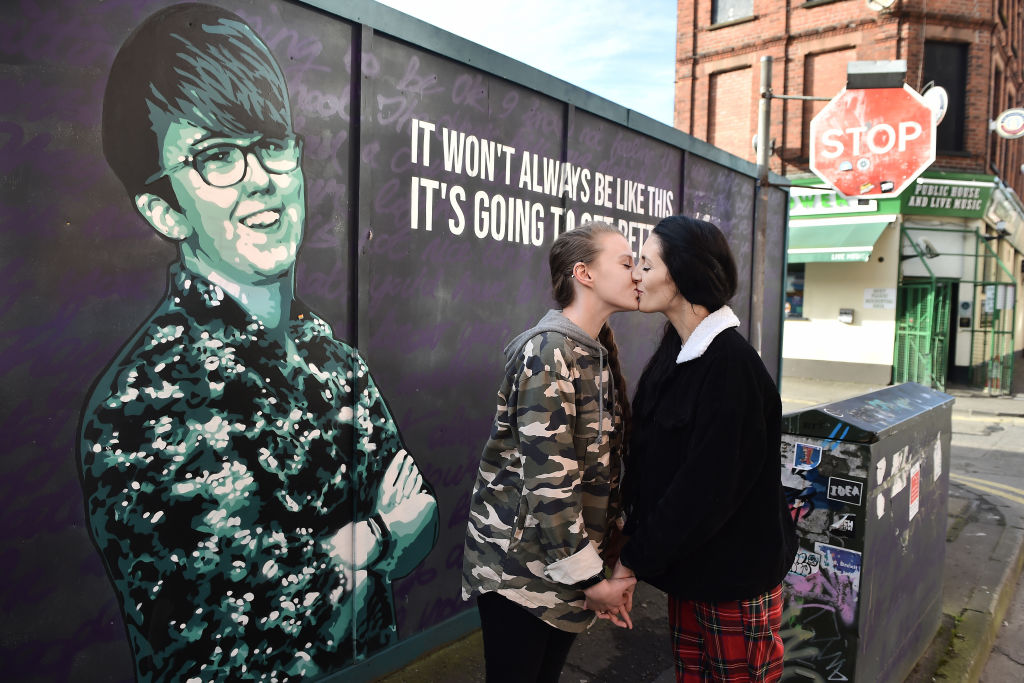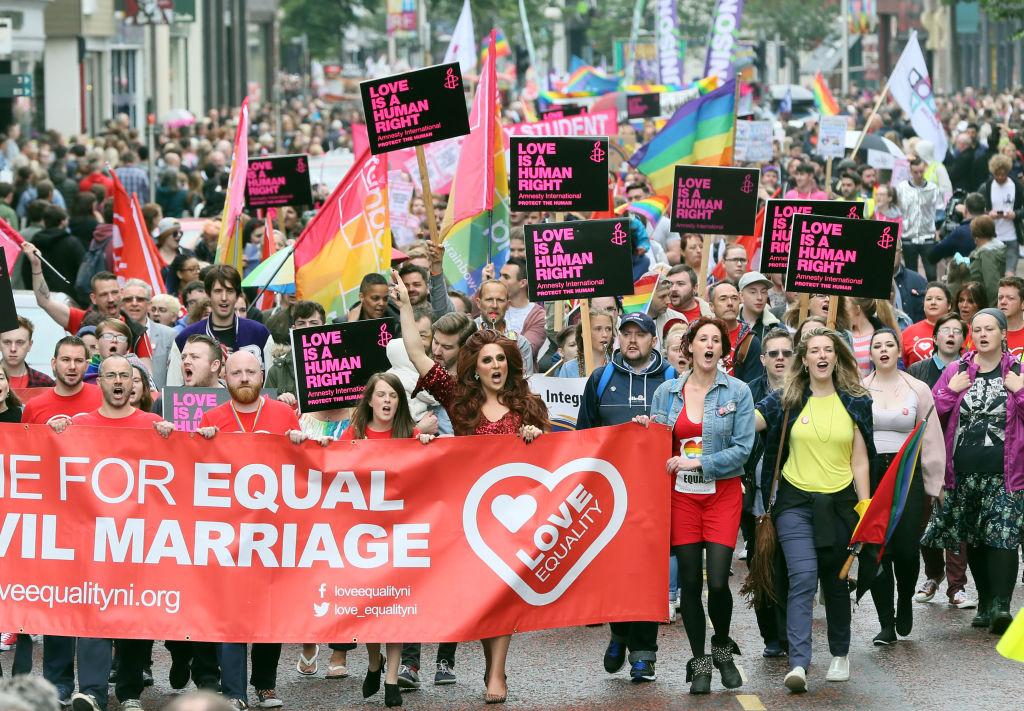
When Belfast native Robyn Peoples found out that her girlfriend had planned a romantic trip to Paris to see Ariana Grande perform, she knew she wanted to do something special. “It was probably a good six months before [the trip] that I started thinking about it, when I got the ring and thought about when and where and how I would do it,” Peoples, 26, says. Her partner Sharni Edwards had no idea that she would be engaged by the end of their holiday in May 2015. “Robyn had had a lock engraved with our anniversary date on,” says Edwards, who is from Brighton, on the south coast of England. “She asked me to put it on one of the bridges, and when I turned around, she was down on one knee and she proposed.”
Nearly five years on, the couple are preparing for their Feb. 11 wedding in Carrickfergus, a town near Belfast. It will be the first same-sex marriage in Northern Ireland, following the passing of new legislation in October. “We’re so excited, we’re ecstatic and we just can’t wait now,” says Edwards, 27, adding that both brides plan to wear wedding dresses. “We haven’t seen each other’s and we’re keeping it a secret until we walk down the aisle.”
It’s a moment equal marriage campaigners in Northern Ireland have been anticipating for years, led by the Love Equality coalition of six organizations. The U.K. government introduced same-sex civil partnerships across Great Britain and Northern Ireland in 2005, giving couples in civil partnerships mostly the same legal rights and responsibilities as married couples. From 2005 to 2017, 1,202 civil partnerships were registered according to the latest available figures from the Northern Ireland Statistics and Research Agency. “Like every LGBT person, I grew up in a world where marriage was the recognized form of relationship,” says John O’Doherty, director of Northern Ireland LGBT charity The Rainbow Project, who entered into a civil partnership in 2018. “When we get engaged, we ask our partners to marry us — that is the language we have. We don’t need a two-tier system of recognizing relationships, and the law should recognize everyone as being equal.”
New legislation finally aligns Northern Ireland with England, Scotland and Wales, where same-sex marriages have been legal since 2014. Northern Ireland has endured nearly three years of political paralysis, lacking its own functioning devolved government from March 2017 until just last month. In the absence of sitting lawmakers, decisions on issues such as same-sex marriage and abortion rights stalled, leading to lawmakers in the U.K. to introduce legislation to keep Northern Ireland running. In July 2019, U.K. lawmakers voted in an amendment requiring the British government to extend same-sex marriage rights to Northern Ireland if the region did not have a functioning government by Oct. 21 that year.
That deadline passed, and beginning on Jan. 13, couples have been able to register their intent to marry. (No data on how many have signed up is currently available). And from next week, 28 days after registering, the first couple will be able to marry, although the new law means there’s currently no way to have a faith-based ceremony in a church. “We were definitely shocked when we learned we’d be able to get married this year,” says Peoples. “We’ve had everything booked for a civil partnership since last January, and it was just the biggest coincidence the law has changed, as we’re now getting married on our six year anniversary.”

The couple live in Belfast, where Peoples is a senior assistant in a care home and Edwards is a waitress, and first met on a night out in the city when Edwards was visiting her cousin. “We instantly just clicked,” says Peoples. After trying out long distance, then living together in Brighton, the pair moved back to Peoples’ hometown five years ago. “This is where we’re going to build our family,” says Peoples. “It wouldn’t have made much sense to get married in England, and then not have it be legally recognized here in Northern Ireland.”
A few years ago, many LGBT residents of Northern Ireland watched events south of the border with hope and frustration. The Republic of Ireland, which is a separate country and not part of the U.K., became the first country in the world to legalize same-sex marriage by popular vote in a historic referendum in May 2015. “We couldn’t comprehend then how people in the south could get married, and that people in the north couldn’t,” says Peoples. That same year, lawmakers in the Northern Ireland assembly voted in majority favor of same-sex marriage for the first time, but the motion was blocked by the socially conservative Democratic Unionist Party using a controversial veto power known as a petition of concern, which required the proposed change to the law to have a cross-party majority. Still, some felt progress was finally possible. “That was the first time we got the majority of our politicians to support equal marriage, and that was a big marker of change for us,” says O’Doherty, adding that the north’s Love Equality campaign has close links with the successful campaign in the south.
There’s also been a shift in public opinion. In 2014, local polling put support for same-sex marriage in Northern Ireland at 40%. During the referendum in the Republic of Ireland, this had increased to 68% according to Ipsos MORI, and opinion polling by Sky in 2019 suggested that 76% of people in Northern Ireland backed same-sex marriage.
But O’Doherty says there’s still work left to do. While same-sex marriages are now legal, people already in same-sex civil partnerships cannot convert to marriages, and there are no provisions for people wishing to have a faith-based same sex marriage. Both issues are part of a public consultation that closes on Feb. 23, which invites members of the public to put forward their views for the government to consider before new regulations are introduced. “It’s wonderful to finally reach this point, but it’s a little bit bittersweet for me. I’m in a civil partnership and we’re not able to get married yet,” says O’Doherty, who has campaigned for equal marriage with his partner since 2012. “Love Equality also wants an opt-in process ensuring that people of faith have the right to celebrate same-sex marriage, but those who don’t want to won’t be required to do so.”
And while Love Equality is hosting public events this week to raise awareness about the consultation, campaigners are excited for the historic change they’ve already achieved. “When you see the light in [Sharni and Robyn’s] eyes that they can get married, it just shows what all the work was for,” says O’Doherty.
It’s down to the last minute touches now for Peoples and Edwards as they prepare to get married on Tuesday, with about 50 people attending the ceremony and 100 people attending the reception in a hotel. Their celebrations come with a sense of gratitude. “If it wasn’t for the people who fought for this, we wouldn’t be able to get married next week,” Edwards says. “We want to say thank you to everyone that has made it possible for us to be equal,” Peoples adds.
More Must-Reads from TIME
- Cybersecurity Experts Are Sounding the Alarm on DOGE
- Meet the 2025 Women of the Year
- The Harsh Truth About Disability Inclusion
- Why Do More Young Adults Have Cancer?
- Colman Domingo Leads With Radical Love
- How to Get Better at Doing Things Alone
- Michelle Zauner Stares Down the Darkness
Contact us at letters@time.com